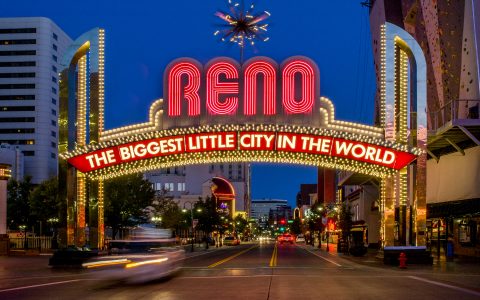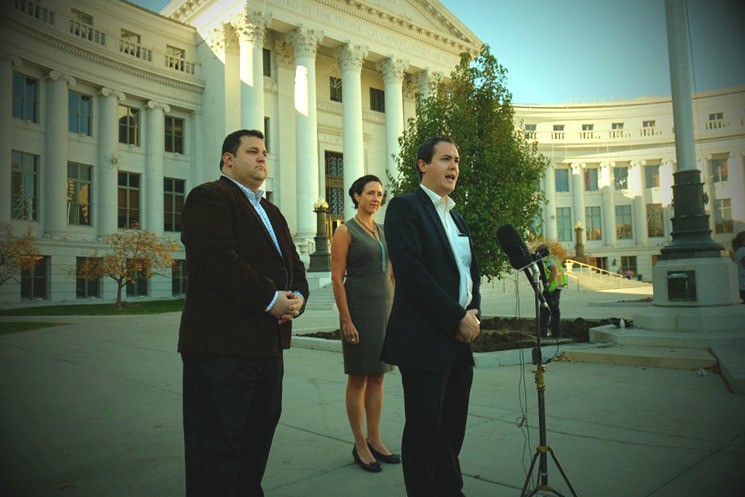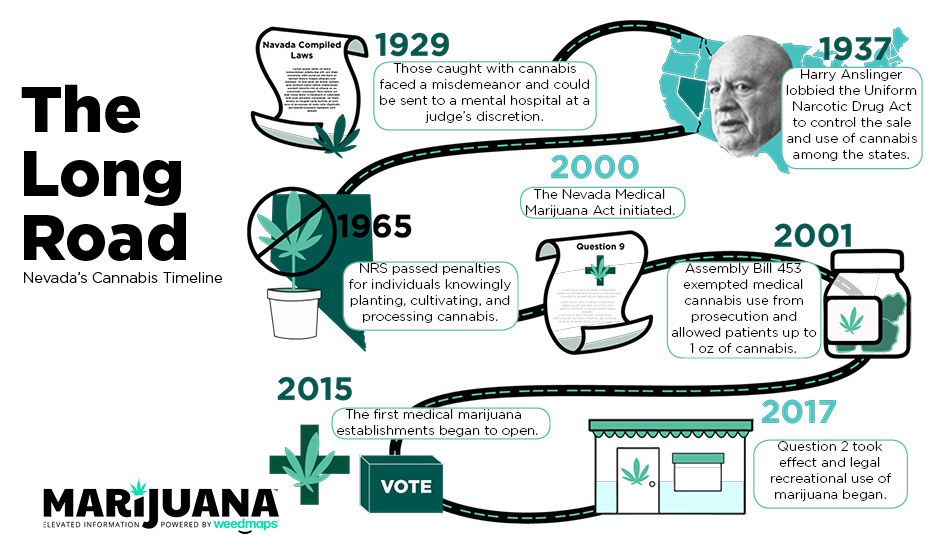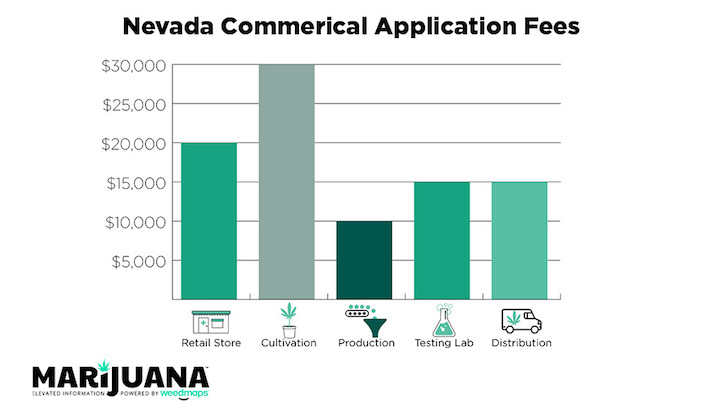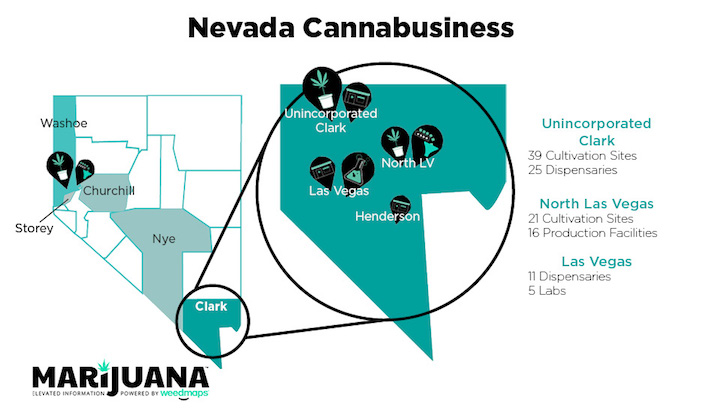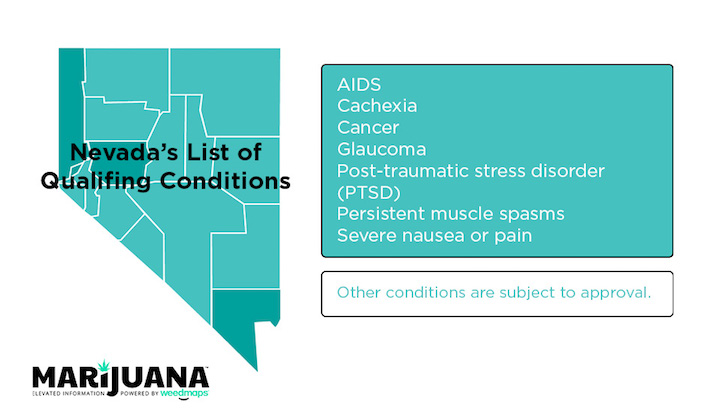Everything You Need to Know About Marijuana in Nevada
Green fireworks lit the sky at midnight on July 1 when hundreds of customers — including state Senator Tick Segerblom — lined up outside of
Nevada dispensaries to legally purchase recreational marijuana in the state for the first time.
With the skyrocketing demand for recreational marijuana, the state of Nevada experienced a
more than 200% increase in cannabis sales and
generated nearly $500,000 in tax revenue over the first four days of sales in July. Prices rose quickly on grams, eighths, and ounces of
flower to keep up with the demand of not only resident cannabis consumers but the population of tourists and travelers going green in Nevada.
Though the influx of resident and tourist cannabis consumers has shown just how big the recreational marijuana payoff has been for the state, novice cannabis consumers may still have many questions. Can I gamble while smoking marijuana? Where can I consume marijuana? What will happen if I light up in public?
Don’t gamble with the law, here’s Marijuana.com’s in-depth look at everything you’ve always wanted to know about Nevada’s marijuana laws and regualtions (but were too afraid to ask).
A History of Cannabis in Nevada
The long road to recreational marijuana legalization in Nevada began when the
Nevada Compiled Laws added cannabis Indicas and Sativas to the list of poisons.
By 1923, Section 5084 under the Nevada Compiled Laws classified Indicas as a narcotic drug. Violators in possession of drugs established in Section 5084 faced a misdemeanor and could be sent to the Nevada State Hospital for Mental Diseases at the judge’s discretion.
In 1937,
Harry Anslinger, a member of the Federal Bureau of Narcotics, lobbied for the passage of the
Uniform Narcotic Drug Act to control the sale and use of narcotics among the states. He presented the
Marihuana Tax Act of 1937, criminalizing marijuana and restricting the possession of the drug to people who paid an excise tax for authorized medicinal and industrial use.
In 1965,
Nevada Revised Statutes (NRS), Chapter 453 passed and provided penalties for individuals knowingly planting, cultivating, and processing marijuana. By 1970, marijuana was classified as a Schedule I drug and restricted on par with narcotics like heroin.
The first vote to legalize the use of medical marijuana in Nevada took place in 2000.
The Nevada Medical Marijuana Act, also known as Question 9, became an initiated constitutional amendment on Nov. 7, 2000 and added
Section 38 to the Constitution of the State of Nevada allowing the use of cannabis by patients upon physician consent for the treatment or alleviation of the qualifying conditions or other conditions approved by law. This section restricted the use of marijuana by minors and required patients and caregivers to register with the state.
In 2001,
Assembly Bill 453 exempted the medicinal use of marijuana from state prosecution and allowed patients to possess up to 1 ounce of marijuana. In 2013, the Nevada Health Division of the Department of Health and Human Services took over regulation of medical marijuana from the State Department of Agriculture and modified NRS Chapter 453 to authorize approved medical marijuana establishments to cultivate, dispense, and manufacture marijuana products, including edibles.
The first medical marijuana establishments began to open for business throughout Nevada in 2015.
In 2015, 54 percent of Nevada voters supported Question 2, also known as the Nevada Marijuana Legalization Initiative, and approved the recreational use of marijuana by adults 21 and over. Question 2 took effect Jan. 1, 2017 and legal marijuana sales began the following July.
The Road to Marijuana Legalization in Nevada
Challenges Along the Way
Casino czar and politically influential billionaire
Sheldon Adelson has advocated his support for cannabis prohibition. Adelson has donated more than $5 million to fight marijuana legalization in Nevada, Florida, Arizona, and Massachusetts despite the fact that the
Dr. Miriam and Sheldon G. Adelson Medical Research Foundation — a medical research organization Adelson owns with his wife — produced a study demonstrating the potential benefits of medical marijuana in correlation with symptoms of Multiple Sclerosis.
Adelson
purchased the Review-Journal Las Vegas for $140 million in 2015. Shortly thereafter, the editorial board
changed their published stance on the value of cannabis, raising questions about Adelson’s
level of influence on the paper’s leadership.
The
Nevada Gaming Control Board has ruled that none of their license holders should have anything to do with the state’s legalization of the marijuana trade. Casino operators are strictly adhering to the federal law that classifies marijuana as a “Schedule 1 drug” with their ban on marijuana in casinos. Gov. Sandoval, who is the chairman of
The Nevada Gaming Policy Committee, has scheduled to meet with the committee which includes casino representatives, gambling regulators, and partners by
Dec. 15, 2017 to discuss cannabis-related events at licensed gaming establishments, the relationship between Nevada casinos and marijuana businesses, and advise on whether licensed gaming establishments will be able to provide financing to or receive financing from cannabis licensees.
“It comes down to something very simple. Maybe the emperor has no clothes. In no way do I feel comfortable in my role as regulator to allow a licensee to permit a felonious act to occur anywhere in their property,” said
Gaming Commission Chairman Tony Alamo.
Members of the alcohol industry formed the
Independent Alcohol Distributors of Nevada (IADON) to pursue a case against the Nevada State Tax Commission to require marijuana distributors to follow the same “Three-Tier System” used for alcohol distribution, which requires an independent distributor to deliver product to retailers.
The Department of Taxation’s proposal for cannabis would eliminate the middleman and put marijuana producers in charge of distributing their own product. Marijuana industry professionals are baffled at the idea of a third-party distributor for cannabis products.
Armen Yemenidjian, CEO of state-licensed Essence Cannabis dispensaries, argues that proposing a middleman to distribute product is ridiculous. Many dispensaries own cultivation sites that are located onsite or within miles of their retail locations, so in many cases, dispensaries would be paying a middleman to help move product from one building to another.
“It doesn’t make any sense,” he said.
Ultimately, cannabis producers were given exclusive rights to act as the distributor and transport wholesale marijuana from growers to retailers for the first 18 months of legal sales.
The Nevada Tax Department and marijuana industry argued there weren’t enough delivery options and that taking on a distributor would lead to lower product counts and lost sales. Alcohol distributors took their case to the
Nevada Supreme Court on Sept. 6 where the Tax Department found the liquor industry lacked the resources to fulfill distribution demands and license other companies.
Nevada’s Current Policy
As of July 2017, Nevada has ended marijuana prohibition and removed all legal penalties at the state level for possession of up to 1 ounce of marijuana for adults 21 and over. Adults can purchase cannabis from state-licensed dispensaries or cultivate up to 12 plants if they do not reside within 25 miles of a dispensary.
To obtain a cultivation, production, lab, or retail cannabis store license, existing Nevada medical marijuana establishments must complete a
Nevada State Marijuana Establishment Application for each license type and location for which they are applying, hold a valid registration certificate, and remain in good standing with all fees current, no citations for illegal activity or criminal conduct and no registration certificate suspensions for enforcement violations since Jan. 1, 2017.
Establishments will be required to file their medical marijuana tax return and pay their taxes before the deadline. Wholesalers in the business of transporting medical marijuana must complete the
Nevada State Marijuana Distributor License Application. Completed applications can be submitted to the Department of Taxation office and must include the $5,000 application fee along with the fee for the desired license:
The department will refund the license fee(s) paid if your application gets denied. The $5,000 application fee is non-refundable.
To date, Nevada has issued licenses to 60 dispensaries, 88 cultivation facilities, 57 production labs, and 11 cannabis laboratories throughout Carson City, Churchill, Henderson, Las Vegas, Mesquite, North Las Vegas, Nye, Storey, Sparks, and Reno.
Currently, two dispensaries in the state have been issued licenses to remain
open 24/7.
Nevada Cannabis Snapshot
Recreational marijuana made its debut on July 1, 2017 and generated more than $3 million in sales revenue and $500,000 in
tax revenue during opening weekend. Cultivators pay a 15%
excise tax on wholesale whereas retail stores licensed to sell marijuana recreationally add a 10% excise tax calculated by the sale price and regular local sales tax.
Medical marijuana cardholders are encouraged to keep their cards for cost reasons.
“Medical has a 2 percent tax on top of state and county taxes,” said Tiffanie Huffman, owner of Green Acres Consulting, a firm that helps residents with the paperwork to get medical marijuana cards. “Recreational they’re going to put a 15 percent tax on the wholesaler. So the wholesaler is going to be responsible for that tax, but you can bet they’re going to have to recoup it somewhere down the line.”
Consequently, prices have
grown due to the new taxes and increased demand. To offset costs, select dispensaries offer incentives to medical marijuana cardholders. According to the Las Vegas Sun, the marijuana industry is estimated to generate as much as $100 million in
state taxes within the first two years.
Medical
To become a medical marijuana patient in Nevada, an individual must be a Nevada resident diagnosed with a
chronic or debilitating condition and register with the state to be protected from state prosecution. Adults and minors 10 and over may enroll as patients. Minors will need a guardian to sign a written minor release statement that acknowledges their physician has explained the possible risks and benefits of the medical use of cannabis and approved the appointed caregiver.
To apply for inclusion in the Nevada Medical Marijuana Cardholder Registry, patients must fill out an
Application Request Form and submit a $25 application request fee to the Division of Public and Behavioral Health with a copy of the front and back of a valid driver’s license or state ID. Patients who wish to elect a caregiver may request a caregiver application. As of July 2017, Nevada medical marijuana cards are valid for up to two years after the issue date.
Once patients have received their application, they will be required to submit to the Department of Motor Vehicles (DMV), the completed application, written documentation from the patient’s physician stating that medicinal marijuana may mitigate the symptoms of their qualifying condition, a $75 application fee, proof of Nevada residency, and the physician’s information.
Registered Nevada medical marijuana patients may possess up to 2.5 ounces of cannabis in a single 14-day period, which must be purchased through the state’s
licensed distribution system of dispensaries. Patients and caregivers who do not have a dispensary in their county are exempted from the requirement and can cultivate up to 12 plants.
Nevada’s medical marijuana program also offers reciprocity for out-of-state patients with valid, verifiable medical marijuana cards. Medical marijuana cardholders from other states may purchase medical cannabis from a licensed Nevada dispensary if they have a valid card that can be verified through a state database of registered users.
Caregivers
Nevada caregivers must be designated by the patient and over the age of 18 with no prior arrests, prosecution, or subject to other legal sanctions for marijuana that violates state laws. To begin the process, caregivers can request a
Caregiver Application and submit it to the state registry with a copy of the front and back of their driver’s license or state-issued ID. Caregivers may only act as a caregiver to one cardholder.
Caregivers may purchase up to 2.5 ounces of cannabis in a single 14-day period from the patient’s designated dispensary and grow up to 12 plants if the patient resides in an area without a dispensary located within 25 miles.
Doctors
Nevada allows board-certified physicians or doctors of osteopathy licensed to practice in Nevada to make a recommendation for medical cannabis treatment. Patients who suffer from qualifying diseases are advised to see a physician who specializes in their condition to avoid jeopardizing their eligibility to apply for the Nevada medical marijuana program. Because marijuana remains illegal on the federal level, not all doctors can prescribe it.
Nevada medical marijuana doctors can offer a recommendation for the use of medicinal cannabis for patients diagnosed with any of the state’s qualifying medical conditions.
Recreational
Voters approved Initiative Question 2 on Nov. 8, 2016, which legalizes, regulates, and taxes recreational cannabis sales to adult users 21 and over. Recreational marijuana customers can purchase up to 1 ounce of cannabis or up to an 1/8 0f an ounce of edibles or concentrates such as wax, shatter, distillate, and crumble from licensed retail marijuana stores.
Tourists
What happens in Vegas, stays in Vegas, including cannabis.
According to state law, marijuana must remain within Nevada’s boundaries and can only be consumed at a private residence. Consumers are prohibited from driving under the influence. Marijuana is still prohibited in public places including concerts, festivals, bars, casinos, and casino-hotels. Because marijuana can only be consumed on private property, visitors who do not own property in Nevada find themselves in a catch-22 with the state law. Travelers are strictly restricted to consuming cannabis on properties with the discretion of the landlord or they can book
420-friendly activities that allow on-site medicating.
The penalty for public cannabis consumption — including edibles, flower, and cannabis oil — starts at $600.
“This is what we spend millions of dollars on: Come here because you can’t do it back home,”
said pro-marijuana state Senator Tick Segerblom. “Then you say: Oh by the way, you can’t do it here.”
This conflict is particularly onerous for travelers staying in a facility that allows gaming, since gaming officials have made it clear they will have zero tolerance for violations that occur in their licensees’ place of business. And nearly every tourist destination in Nevada has some form of gambling — even the gas stations.
Sen. Segerblom has addressed this ruling and is working toward legalizing social cannabis clubs and marijuana lounges that will allow cannabis consumption in public indoor spaces. Nevada Governor Brian Sandoval said he believes Nevada is getting ahead of itself with the idea of marijuana lounges.
“I think it’s way too early to be doing something like that,”
he said. “I think it’s important that we continue to see how the sale of recreational marijuana evolves.”
What Not To Do
So how can Nevada visitors and residents enjoy recreational cannabis while remaining in compliance with the law?
Though adult users can purchase recreational cannabis, Question 2 does not allow public consumption of marijuana and does not change the existing driving-under-the-influence laws. Driving while under the influence of any intoxicating substance is against the law. Unlicensed recreational marijuana users are also prohibited from producing or distributing marijuana products.
Other restrictions include distributing marijuana to users under 21, and possessing or using marijuana within 1,000 feet of school grounds or 300 feet from community facilities and the Nevada Department of Corrections. Workplaces also have the ability to ban the use of marijuana on their premises or by their employees.
Stay protected under Nevada law and follow the rules and regulations as advised by dispensaries. Nevada requires visitors to sign an affidavit when they enter a state-licensed dispensary that outlines the use of cannabis.
Marijuana cannot be transported across state lines. Visitors coming to and from Nevada must consume their marijuana in a private residence or forfeit their product before traveling out of the state.
On the Horizon
Could we see cannabis in casinos? Not for a while. Casinos won’t take a gamble on losing their licenses — they strictly abide by federal law.
Leslie Bocskor, president of
Electrum Partners, an advisory firm that specializes in medical and recreational marijuana, believes marijuana will be banned in casinos until federal prohibition drops. However, Andrew Jolley, president of the Nevada Dispensary Association and CEO of The Source dispensary, believes in the idea of cannabis lounges.
“We’ll be surprised at how many locals find value in these lounges, think about how many bars we have or wine tasting facilities and events,”
Jolley said. “It’s crazy to think that marijuana is somehow different than that. It’s really not.”
The road to complete legalization of recreational marijuana still faces its challenges but with government officials like Senator Tick Segerblom in support of adult-use marijuana, Nevada is progressing through the marijuana movement.
“Everything we know shows that millennials are very pro-marijuana, and that’s the new marketing push. This is a game-changer for Las Vegas and tourism here as far as I’m concerned … Amsterdam on steroids,”
Segerblom said. “I’m a child of the 60s, and I saw that it didn’t destroy the world. It’s a no-brainer to make it regulated, to tax it, to test it, and to let people enjoy it.”
